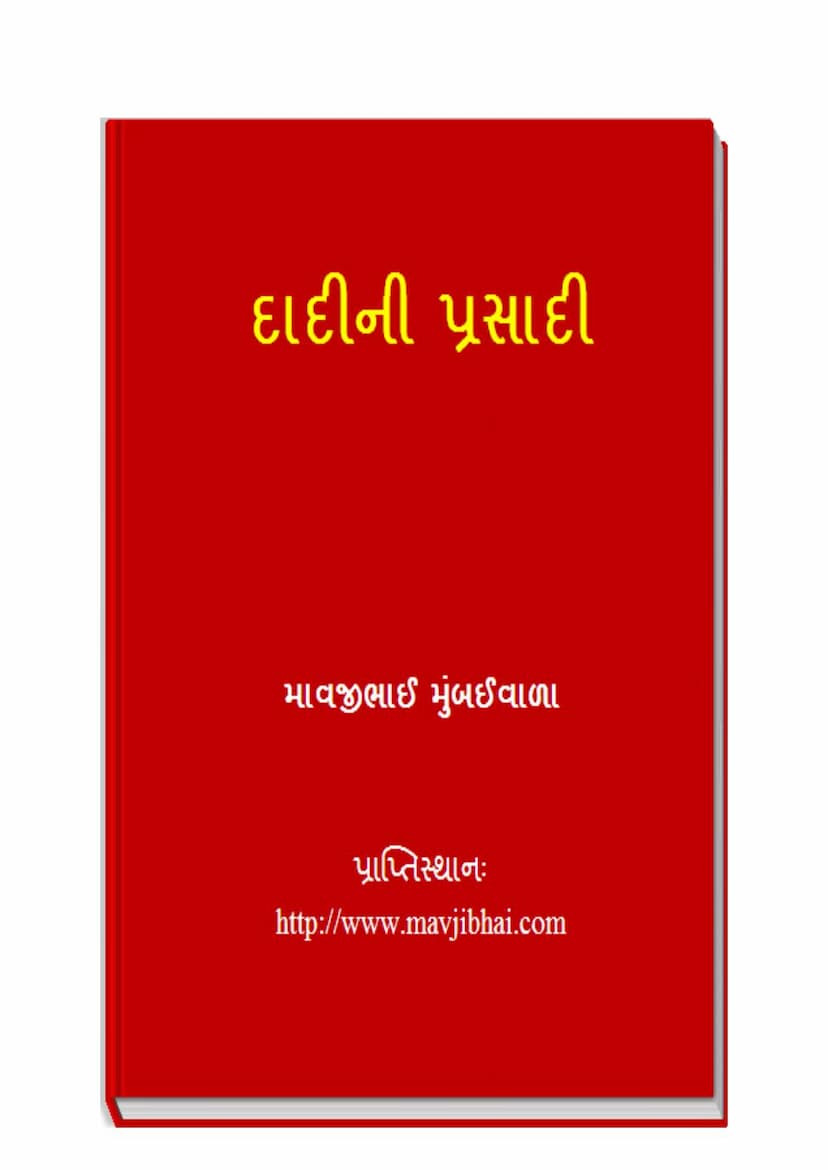Dadini Prasadi
Added to library: September 1, 2025

Summary
Here's a comprehensive summary of the Jain text "Dadini Prasadi" by Mavjibhai Mumbaiwala, based on the provided pages:
Book Title: Dadini Prasadi (Grandmother's Prasad) Author: Mavjibhai Mumbaiwala Publisher: Mavjibhai Mumbaiwala
Overview:
"Dadini Prasadi" is a collection of Sanskrit sayings, prayers, and philosophical insights, presented in Gujarati with their meanings. The author, Mavjibhai Mumbaiwala, dedicates the book to Shri Suresh Dalal, describing him as a beloved admirer of quotes and an undisputed king of quotable sayings, a man of culture.
Core Concept:
The title "Dadini Prasadi" signifies a connection to the ancestral heritage, specifically to Sanskrit, referred to as the "grandmother language" (dadi bhasha) of Gujarati. The book aims to present a "prasad" (a blessing or offering) from the vast treasure of knowledge within Sanskrit, making it easily digestible (supachya) by providing Gujarati interpretations (bhavarth) alongside each verse.
Content Highlights:
The book is structured around presenting various Sanskrit verses, often attributed to ancient texts, scriptures, and wise individuals, accompanied by their Gujarati translations and explanations. The content broadly covers:
- Prayers and Invocation: The initial pages feature well-known Sanskrit prayers like the Shanti Path from the Upanishads, the Gayatri Mantra, and verses seeking divine blessings for learning, protection, and well-being. These are presented with their Gujarati translations, emphasizing themes of seeking truth, light, knowledge, and harmony.
- Wisdom and Ethics (Subhashitas): The majority of the book consists of "subhashitas" – aphorisms, proverbs, and ethical teachings that offer guidance on various aspects of life. These cover a wide range of topics:
- The Importance of Effort and Character: Verses emphasize diligence, the futility of laziness, the value of perseverance, and the cultivation of good character. For example, "Alasya ku to vidya" (Where does the lazy person get knowledge?) and the importance of courage and patience.
- Dealing with Others: The text provides advice on handling difficult people (durjan), the importance of politeness, the consequences of pride and ego, and the nature of true friendship.
- Values and Virtues: Emphasis is placed on virtues like truthfulness, non-violence (ahimsa paramo dharma), generosity (dana), forgiveness (kshama), contentment (santosh), and the pursuit of knowledge (vidya).
- Understanding Life and Its Impermanence: Many verses reflect on the transient nature of life, the cycle of happiness and sorrow, and the importance of living ethically.
- The Power of Knowledge: The text repeatedly highlights the superiority of knowledge (vidya) over material wealth, emphasizing that true wealth is intangible and enduring.
- Discrimination and Wisdom: The book encourages discerning judgment, distinguishing between good and bad, and not being swayed by superficial appearances.
- The Nature of Reality: Some verses touch upon philosophical concepts, the omnipresence of the divine, and the interconnectedness of all things.
- Practical Advice: The collection includes practical advice on daily conduct, such as how to behave in society, the importance of humility, and the consequences of actions.
Key Themes and Recurring Messages:
- The Primacy of Knowledge (Vidya): Knowledge is consistently portrayed as the most valuable possession, superior to wealth and status, and essential for liberation.
- Ethical Conduct and Dharma: Living righteously, practicing compassion, truthfulness, and non-violence are central tenets.
- Perseverance and Effort (Udyama): Success is attributed to hard work, courage, and consistent effort, rather than solely relying on fate.
- Humility and Contentment: Arrogance is discouraged, while humility and contentment are presented as paths to happiness.
- Discernment: The importance of critical thinking and making wise choices is frequently highlighted.
- The Transient Nature of Life: The collection often reminds readers of the impermanence of worldly possessions and life itself, urging them to focus on spiritual and ethical pursuits.
- The Power of Words and Actions: The impact of speech and deeds on oneself and others is a recurring theme.
- The Role of Mother Tongue and Heritage: The opening pages emphasize the importance of ancestral languages and the wisdom they contain.
Presentation:
The book's format is designed for accessibility. Each Sanskrit verse is presented, followed by its Gujarati translation and often a brief commentary or explanation, making the profound wisdom of the Sanskrit language understandable to a wider audience.
In essence, "Dadini Prasadi" serves as a spiritual and ethical guide, offering timeless wisdom gleaned from Sanskrit literature to help readers navigate life with virtue, knowledge, and inner peace. It's a compilation designed to enrich the reader's understanding and practice of a meaningful life.